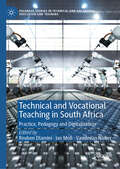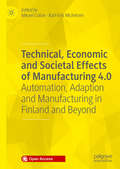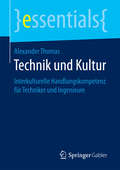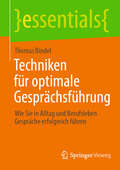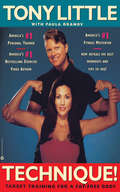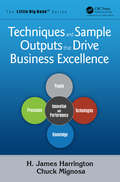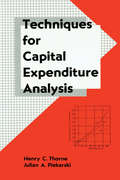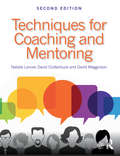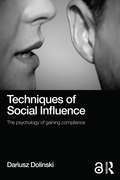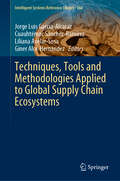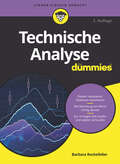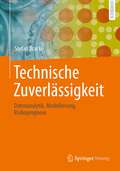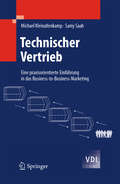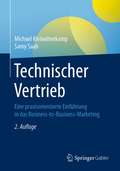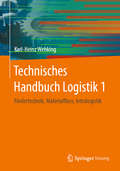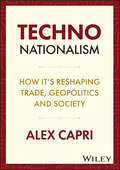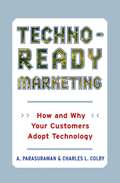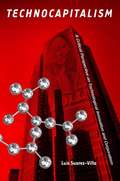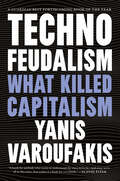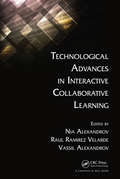- Table View
- List View
Technical and Vocational Teaching in South Africa: Practice, Pedagogy and Digitalisation (Palgrave Studies in Technical and Vocational Education and Training)
by Reuben Dlamini Ian Moll Vasidevan NaikerThis book unpacks the notion of pedagogy in South African technical and vocational education and training (TVET), enhancing the importance of the psychological dimension of learning. The book is premised on the idea that as stories of actual, grounded teaching and learning practices emerge from South African colleges, a coherent picture of pedagogy can be established. With chapters by practising TVET educators writing about their own work, the volume seeks to reconceptualise vocational teaching and learning processes with diversity and inclusivity in mind. The book will be of interest to students and scholars of TVET and education in South Africa, as well as South African college practitioners and policymakers.
Technical, Economic and Societal Effects of Manufacturing 4.0: Automation, Adaption and Manufacturing in Finland and Beyond
by Mikael Collan Karl-Erik MichelsenThis open access book is among the first cross-disciplinary works about Manufacturing 4.0. It includes chapters about the technical, the economic, and the social aspects of this important phenomenon. Together the material presented allows the reader to develop a holistic picture of where the manufacturing industry and the parts of the society that depend on it may be going in the future. Manufacturing 4.0 is not only a technical change, nor is it a purely technically driven change, but it is a societal change that has the potential to disrupt the way societies are constructed both in the positive and in the negative.This book will be of interest to scholars researching manufacturing, technological innovation, innovation management and industry 4.0.
Technik und Kultur: Interkulturelle Handlungskompetenz für Techniker und Ingenieure (essentials)
by Alexander ThomasDieses essential bietet einen Zugang zur interkulturellen Thematik f#65533;r Techniker und Ingenieure anhand von Fallbeispielen aus der Praxis deutscher Fach- und F#65533;hrungskr#65533;fte im Auslandseinsatz. Es werden die wichtigsten Komponenten interkultureller Handlungskompetenz benannt und n#65533;her analysiert. Zudem werden Methoden beschrieben, mit denen es gelingt, unterschiedliche kulturelle Einflussfaktoren fr#65533;hzeitig zu erkennen und entsprechend zu bearbeiten. Der erfahrene Autor Alexander Thomas sensibilisiert f#65533;r kulturell bedingte Problemlagen und zeigt Wege auf, wie eine eigenst#65533;ndige Entwicklung interkultureller Handlungskompetenz gelingen kann.
Techniken für optimale Gesprächsführung: Wie Sie in Alltag und Berufsleben Gespräche erfolgreich führen (essentials)
by Thomas BindelThomas Bindel schlägt Ihnen vor, mit welchen Worten Sie in schwierigen Situationen richtig reagieren. Er verrät Ihnen, mit welcher Systematik Sie Gespräche und Verhandlungen perfekt vorbereiten. Und er zeigt Ihnen, wie Sie mit Menschen vertieft ins Gespräch kommen, indem Sie besser zuhören und treffende Fragen stellen. Das vorliegende Buch bietet somit ein Konzentrat aus den wichtigsten Methoden, um Gespräche optimal führen zu können: Ausgestattet mit dem Erfolgsprinzip eines amerikanischen Präsidenten, diversen Denkhüten, passenden Strategien und Techniken für Gesprächsvorbereitung, -führung sowie -nachbereitung übersteht man die Begegnung mit dem Freud&’schen Eisberg und findet so zu einer Kommunikation, die durch ein Quadrat runder läuft und gewaltfrei mehr erreicht.
Technique: Target Training for a Fat-Free Body
by Tony Little Paula DranovTony has designed Technique! as a workbook, with easy charts and handy schedules to guide you personally throughout your fitness progress as if he were in your home daily educating and motivating you. In fact, this book is so personalized it's like having Tony for your own personal trainer. You get his internationally famous system, emphasizing safe and successful techniques that have affected over 5 million people. Book jacket.
Techniques and Sample Outputs that Drive Business Excellence (The Little Big Book Series)
by H. James Harrington Chuck MignosaMany organizations are looking for that magic tool or methodology that will suddenly transform them into outstanding organizations. Unfortunately, there is no one right answer for all organizations or even for a single organization. Successful organizations skillfully integrate the appropriate improvement approaches with honesty, commitment, and co
Techniques for Capital Expenditure Analysis (Cost Engineering)
by Henry C. Thorne Julian A. PiekatskiThis work examines the most important techniques for analyzing the profitability of capital investments. It discusses time value mechanics and financial concepts, including discounted cash flow, return on investment, incremental analysis, cash flow tables, income taxes, depreciation, cost of capital and risk analysis. It provides a broad introduction to project evaluation and data needs.;This book is intended for: cost, project, design, mechanical, chemical, industrial,electronic,electrical and construction engineers; project and budget managers; cost estimators and controllers; planners and schedulers; and upper-level undergraduate and graduate students in these disciplines.
Techniques for Coaching and Mentoring
by David Clutterbuck David Megginson Natalie LancerThis is a fully revised and updated second edition of the successful Techniques for Coaching and Mentoring, also incorporating the best bits of its sister text Further Techniques for Coaching and Mentoring. The book presents a comprehensive and critical overview of the wide range of tools and techniques available to coaches and mentors. With a strong academic underpinning, it explores a wide range of approaches, and provides techniques both for use with clients and to support professional development of the coach or mentor. Key features include: Easy-to-use resources and techniques for one-to-one coaching; Case studies throughout the text, helping to put theory into practice; An overview of different theoretical approaches; A dedicated section on ‘themes for the coach’ discussing coaching across cultures, evaluating your coaching and looking after yourself as a coach; and Downloadable worksheets for each technique. Techniques for Coaching and Mentoring 2nd Edition is an invaluable resource for professional coaches and mentors looking to enhance their practice, and for students of coaching and mentoring.
Techniques of Decision Making, Uncertain Reasoning and Regression Analysis Under the Hesitant Fuzzy Environment and Their Applications (Uncertainty and Operations Research)
by Zeshui Xu Chenyang SongThis book mainly introduces some techniques of decision-making, uncertain reasoning and regression analysis under the hesitant fuzzy environment and expands the applications of hesitant fuzzy sets in solving practical problems. The book pursues three major objectives: (1) to introduce some techniques about decision-making, uncertain reasoning and regression analysis under the hesitant fuzzy environment, (2) to prove these techniques theoretically and (3) to apply the involved techniques to practical problems. The book is especially valuable for readers to understand how hesitant fuzzy set could be employed in decision-making, uncertain reasoning and regression analysis and motivates researchers to expand more application fields of hesitant fuzzy set.
Techniques of Social Influence: The psychology of gaining compliance
by Dariusz DolinskiEvery day we are asked to fulfil others’ requests, and we make regular requests of others too, seeking compliance with our desires, commands and suggestions. This accessible text provides a uniquely in-depth overview of the different social influence techniques people use in order to improve the chances of their requests being fulfilled. It both describes each of the techniques in question and explores the research behind them, considering questions such as: How do we know that they work? Under what conditions are they more or less likely to be effective? How might individuals successfully resist attempts by others to influence them? The book groups social influence techniques according to a common characteristic: for instance, early chapters describe "sequential" techniques, and techniques involving egotistic mechanisms, such as using the name of one’s interlocutor. Later chapters present techniques based on gestures and facial movements, and others based on the use of specific words, re-examining on the way whether "please" really is a magic word. In every case, author Dariusz Dolinski discusses the existing experimental studies exploring their effectiveness, and how that effectiveness is enhanced or reduced under certain conditions. The book draws on historical material as well as the most up-to-date research, and unpicks the methodological and theoretical controversies involved. The ideal introduction for psychology graduates and undergraduates studying social influence and persuasion, Techniques of Social Influence will also appeal to scholars and students in neighbouring disciplines, as well as interested marketing professionals and practitioners in related fields.
Techniques, Tools and Methodologies Applied to Global Supply Chain Ecosystems (Intelligent Systems Reference Library #166)
by Jorge Luis García-Alcaraz Giner Alor-Hernández Cuauhtémoc Sánchez-Ramírez Liliana Avelar-SosaThis book presents the latest developments concerning techniques, tools, and methodologies in supply chain ecosystems. It gathers contributions from a variety of experts, who analyze a range of case studies and industrial sectors such as manufacturing, energy, agricultural, healthcare, humanitarian logistics, and urban goods distribution, to name but a few. The book is chiefly intended to meet the needs of two sectors: firstly, the academic sector, so as to familiarize students, professors, and researchers with the tools that are now being used to optimize supply chains; and secondly, the industrial and managerial sector, so that supply chain management practitioners can benefit from methods and tools that are yielding valuable results in other contexts.
Techniques, Tools and Methodologies Applied to Quality Assurance in Manufacturing
by Cuauhtémoc Sánchez-Ramírez Jorge Luis García Alcaraz Alfonso Jesús Gil LópezThis book presents a collection of real cases from industrial practices that production system and quality managers implement to ensure a high quality as well as a low cost in products. This book is divided in sections that are focused on: · The quality and philosophies implemented to production systems; starting from the product design as well as from the supply system. · The principal statistical techniques applied to the quality assurance (statistical quality control, analysis of tests and failure, quality function deployment, accelerated life tests, among others), the process of gathering information, its validation, its reliability process, and techniques for data analysis. · The techniques applied to the integration of human resources in the process of quality assurance, such as managers and operators’ participation, training, and training processes. · Use of information and communications technologies, software, and programs implemented to guarantee the quality of the products in the production systems. ISO standards and policies that are used for quality management and monitoring.
Technische Analyse für Dummies (Für Dummies)
by Barbara RockefellerMöchten Sie sich genauer mit der Technischen Analyse, auch Chartanalyse genannt, beschäftigen? In diesem Buch lernen Sie zunächst Grundbegriffe wie Widerstand, Unterstützung oder Trendkanal kennen und die Werkzeuge der Technischen Analyse nutzen. Und da beim Trading das richtige Timing (fast) alles ist, erfahren Sie, wie Sie aus Chartverläufen die richtigen Schlüsse für Kauf oder Verkauf ziehen können. Lernen Sie, das Marktverhalten am Wertpapiermarkt anhand der Balken und ihrer Positionen auf dem Chart einzuschätzen und im richtigen Moment zu reagieren, um so an der Börse erfolgreich zu sein.
Technische Transport- und Lagerlogistik
by Heinrich MartinDieses Lehrbuch bearbeitet in leicht verständlicher Art die Themen der Transport- und Lagerbereiche nach funktionellem Aufbau, Vor- und Nachteilen, sowie deren Einsatzgebieten. Besondere Berücksichtigung finden flexible Transportmittel, neue Lagersysteme und Automatisierungsmöglichkeiten bei der Kommissioniertechnik.Die Zielgruppen- Studierende des Maschinenbaus im Fach Fördertechnik sowie technischer Fachrichtungen- Studierende des Wirtschaftsingenieurwesens im Fach Logistik an Fachhochschulen und Universitäten- Produktions-, Planungs- und Wirtschaftsingenieure der Industrie und der Beratungsbranche, die sich mit der planerischen Seite dieses Fachgebiets beschäftigen
Technische Zuverlässigkeit: Datenanalytik, Modellierung, Risikoprognose
by Stefan BrackeDieses Lehrbuch vermittelt Methoden der Datenanalytik zur Abbildung der Technischen Zuverlässigkeit und Risikoprognose unter Zuhilfenahme der Probabilistik, Statistik sowie der Modellbildung. Eingesetzt werden die Methoden der Technischen Zuverlässigkeit in den elementaren Phasen des Produktentstehungsprozesses (Konzept- und Serienentwicklung, Produktion) sowie während des Feldeinsatzes technischer Produkte. Dieses Buch umfasst ausführlich Grundlagen der Statistik, graphische Visualisierung und Berechnungsverfahren. Zahlreiche Fallbeispiele werden durchgerechnet und repräsentieren typische Aufgabenstellungen des Ingenieurs bei der Zuverlässigkeitsanalyse in Entwicklung/Produktion sowie der Beurteilung von Feldschäden. Die Zielgruppen sind somit gleichermaßen Studenten der Ingenieurwissenschaften sowie Ingenieure, welche sich mit der Technischen Zuverlässigkeit im Rahmen der Entwicklung und Herstellung komplexer technischer Produkte sowie im Rahmen der Felddatenanalyse auseinandersetzen. Die Darlegung der Methoden und Verfahren der Technischen Zuverlässigkeit folgt dem Leitmotiv „Theoriegeleitet – Praxisorientiert“, sodass das vorliegende Buch sowohl als Nachschlagewerk als auch als Lehrbuch Verwendung finden kann.
Technischer Ausbau von Gebäuden: und nachhaltige Gebäudetechnik
by Dirk BohneAuf dem neuesten “Stand der Technik” präsentiert sich das Buch noch übersichtlicher mit einer neu gegliederten, äußerst benutzerfreundlichen Darbietung des Stoffes. Das Fachwissen wurde dabei konzentriert und komprimiert auf die für Architekten und Bauingenieure relevanten Sachverhalte und Zusammenhänge. Komplett neu gestaltet wurde der umfangreiche Abbildungsteil mit hochwertigen Zeichnungen zur bildhaften Kommentierung des Textes. Um im Technischen Ausbau mit der technologischen Entwicklung, den steigenden Komfortansprüchen und den Erfordernissen eines wirtschaftlichen und umweltfreundlichen Umgangs mit der Energie Schritt zu halten, ist der “Wellpott/ Bohne” weiterhin ein unverzichtbares Grundlagenbuch.
Technischer Vertrieb
by Michael Kleinaltenkamp Samy SaabDas Buch liefert eine praxisorientierte Einführung in das Gebiet des technischen Vertriebs bzw. Business-to-Business-Marketings. Die Autoren behandeln alle relevanten Themen des Fachs und stellen die wichtigsten Konzepte und Methoden vor. Ziel ist es, Praktikern und Studierenden mit ingenieurswissenschaftlichem oder einem anderen nicht-kaufmännischen Hintergrund einen schnellen Einstieg und zugleich umfassenden Überblick zu dem Thema zu ermöglichen.
Technischer Vertrieb: Eine praxisorientierte Einführung in das Business-to-Business-Marketing
by Michael Kleinaltenkamp Samy SaabDas Buch liefert eine praxisorientierte Einführung in das Gebiet des technischen Vertriebs bzw. Business-to-Business-Marketings. Die Autoren behandeln alle relevanten Themen des Fachs und stellen die wichtigsten Konzepte und Methoden vor. Ziel ist es, Praktikern und Studierenden mit ingenieurswissenschaftlichem oder einem anderen nicht-kaufmännischen Hintergrund einen schnellen Einstieg und zugleich umfassenden Überblick zu dem Thema zu ermöglichen.
Technisches Handbuch Logistik 1: Fördertechnik, Materialfluss, Intralogistik
by Karl-Heinz WehkingDieses zweibändige Handbuch vermittelt die systemtechnischen Grundlagen und den technischen Entwicklungsstand der Bereiche Materialfluss und Logistik.Der erste Band behandelt zunächst die Bereiche der Entwicklung und Eingrenzung von Fördertechnik, Materialflusstechnik, Intralogistik und technischer Logistik. Diese beinhalten die Beschaffungs-, Produktions-, Distributions- und Entsorgungslogistik. Eingegangen wird ebenfalls auf die wirtschaftliche und volkswirtschaftliche Bedeutung der Logistik.Daran anschließend werden die Bauelemente der Logistik nach den Konstruktionselementen der Fördertechnik (Seile, Ketten, Bremsen etc.) vorgestellt sowie auf die Antriebstechnik und Ölhydraulik eingegangen. Ein weiteres Kernthema dieses Abschnitts sind die Konstruktionselemente der Elektrotechnik, d. h. der Sensorik, Aktorik, Steuerungs- und Regelungstechnik. Mit beiden Komponenten lassen sich die maschinenbaulichen Konstruktion und die Automatisierung der Maschinen und Einrichtungen der Logistik realisieren. Abschließend wird die Systematik der Materialflussaufgaben, hauptsächlich für die Stückgüter, umfangreich dargestellt. Es wird auf Verpackungstechnik und Ladeeinheitenbildung, Lagertechnik, Fördertechnik (Stetig- und Unstetigförderer), Sortier- und Kommissioniertechnik, Verkehrstechnik, Handhabungstechnik und Weiteres eingegangen.
Technisches Handbuch Logistik 2: Fördertechnik, Materialfluss, Intralogistik
by Karl-Heinz WehkingDieses zweibändige Handbuch vermittelt die systemtechnischen Grundlagen und den technischen Entwicklungsstand der Bereiche Materialfluss und Logistik. Der zweite Band beginnt mit einer systematischen und umfassenden Darstellung der heutigen Informations- und Steuerungssysteme der Logistik sowie deren zukünftige Weiterentwicklung. Heutige Systeme der Materialflusstechnik und Logistik sind ohne digitale Informations- und Steuerungssysteme nicht vorstellbar und optimierungsfähig. In diesem Zusammenhang werden beispielsweise ERP-Systeme, Warehouse Management Systeme (WMS), Warehouse Control Systeme (WCS), Transportmanagementsysteme (TMS) und Weiteres. behandelt. Daran schließt sich das Thema rechnergestützte Planungstechniken mit den Teilgebieten Aufgaben der Planung, Vorgehensweise, Simulation und Expertensysteme an. Am Ende dieses Teilkapitels werden Forschungsergebnisse des IFT zur Weiterentwicklung im Bereich der EDV-gestützten Planung vorgestellt. Abschließend wird an zwei Projektbeispielen die heutige moderne und hochautomatisierte Einrichtung der Distributions- und zukünftigen Automobilproduktionslogistik gezeigt (Forschungsprojekt des IFT ARENA2036). Bei letzterem geht es um die flexible wandlungsfähige Automobilproduktion für die Stückzahl 1.
Techno-Nationalism: How It's Reshaping Trade, Geopolitics and Society
by Alex CapriThe essential book on technology-related competition between nations and its impact on the world Nations have long sought to use technology as a power-multiplier for their own ambitions. In the twenty-first century, at a time of unprecedented innovation, the United States and China are in a race to achieve technological superiority. But how will this affect long-standing trade ties and the international landscape? Techno-nationalism holds that a nation’s economic strength and its national security — even its social stability— are linked to the technological prowess of its institutions and enterprises. From artificial intelligence and biotechnology to semiconductors and quantum science, nations that fall behind in the technology race risk becoming permanent losers, with potentially catastrophic consequences. After decades of trade liberalization and free-flowing investment into China, a paradigm shift amongst a bloc of like-minded, mostly Western countries, has set in motion epic change. Techno-nationalism is reorganizing the global economy. Alex Capri, who spent decades as a trade and supply chain professional in China and throughout the world, lays out the dynamics of this change and its underlying themes, from the paradox facing U.S.-China commercial linkages to the grey zones in which states and firms must now try to coexist. He provides a realist’s perspective of both the challenges and opportunities facing international actors. Regarding the elements of techno-nationalism, Capri paints a masterful picture of the strategic decoupling of supply chains and the re-shoring of key manufacturing ecosystems such as semiconductors. He provides an illuminating account of the geopolitics of data, and the fragmentation of the digital landscape, as well as the bifurcation of financial markets, academia, and R&D around Chinese and American spheres of influence. These themes carry through to Capri’s fascinating accounts of the modern-day space-race, and space-based Internet, undersea cables, hypersonic warfare, the AI arms race, drones, and robotics. The book’s clear explanations of semiconductors and their importance is highly useful. TECHNO-Nationalism is a must-read for business and government leaders, investors and strategists, academics, journalists, NGOs, or anyone who wants to experience a thoroughly entertaining and educational account of one the most important issues of our time.
Techno-Ready Marketing: How and Why Customers Adopt Technology
by A. Parasuraman Charles L. ColbyConventional techniques for marketing technology products fail primarily because marketers do not truly understand their customers. Do you know what customers really think about your technology? Now, drawing on their award-winning research and case studies ranging from America Online to the Discovery Channel, marketing experts A. Parasuraman and Charles L. Colby demonstrate how the adoption of technology is influenced by unique beliefs that do not apply to conventional products and services. In the context of a general set of powerful techno-marketing strategies, Parasuraman and Colby introduce "Technology Readiness" (TR), a groundbreaking concept that enables you to measure and assess a customer's predisposition to adopt new technologies. Employing their TR construct -- a psychological amalgam of fears, hopes, desires, and frustrations about technology -- the authors identify five types of technology customers: the highly optimistic and innovative "Explorers," the innovative yet cautious "Pioneers," the uncertain "Skeptics" who need the benefits of technology proved, the insecure "Paranoids," and the resistant "Laggards." Using this typology, you can customize your technology strategies by combining insights from your context-specific assessments with general marketing strategies presented in the book. Essential reading in technology companies will be the chapter devoted to Parasuraman's Pyramid Model, which explains the critical role technology plays in a marketing organization as a link between employees, the organization, and the customer. Finally, the authors have included a self-administered quiz so you can score your own Technology Readiness and a chapter on the "Techno-Ready Marketing Audit" to provide a framework for taking immediate action based on the precepts in this book.
Technocapitalism: A Critical Perspective on Technological Innovation and Corporatism
by Luis Suarez-VillaA new version of capitalism, grounded in technology and science, is spawning new forms of corporate power and organization that will have major implications for the twenty-first century. Technological creativity is thereby turned into a commodity in new corporate regimes that are primarily oriented toward research and intellectual appropriation. This phenomenon is likely to have major social, economic and political consequences, as the new corporatism becomes ever more intrusive and rapacious through its control over technology and innovation. In his provocative bookTechnocapitalism, Luis Suarez-Villa addresses this phenomenon from the perspective of radical political economy and social criticism. Grounded in the premise that relations of power influence how human creativity and technology are exploited by the new corporatism, the author argues that new forms of democratic participation and resistance are needed, if the social pathologies created by this new version of capitalism are to be checked. Considering the new sectors affected by technocapitalism, such as biotechnology, nanotechnology, bioinformatics, and genomics, Suarez-Villa deciphers the common threads of power and organization that drive their corporatization. These new sectors, and the corporate apparatus set up to extract profit and power through them, are imposing standards, creating business models, molding social governance, and influencing social relations at all levels. The new reality they create is likely to affect most every aspect of human existence, including work, health, life, and nature itself.
Technofeudalism: What Killed Capitalism
by Yanis VaroufakisIn a revelatory and pathbreaking work, the #1 international bestselling economist opens our eyes to the new power that is reshaping our lives and the world . . .&“The Thucydides of our time.&” —Jeffrey SachsBig tech has replaced capitalism's twin pillars—markets and profit—with its platforms and rents. With every click and scroll, we labor like serfs to increase its power. Welcome to technofeudalism . . .Perhaps we were too distracted by the pandemic, or the endless financial crises, or the rise of TikTok. But under cover of them all, a new and more exploitative system has been taking hold. Insane sums of money that were supposed to re-float our economies after the crash of 2008 went to big tech instead. With it they funded the construction of their private cloud fiefdoms and privatized the internet. Technofeudalism says Yanis Varoufakis, is the new power that is reshaping our lives and the world, and is the greatest current threat to the liberal individual, to our efforts to avert climate catastrophe—and to democracy itself. It also lies behind the new geopolitical tensions, especially the New Cold War between the United States and China.Drawing on stories from Greek myth and pop culture, from Homer to Mad Men, Varoufakis explains this revolutionary transformation: how it enslaves our minds, how it rewrites the rules of global power, and, ultimately, what it will take overthrow it.
Technological Advances in Interactive Collaborative Learning
by Nia Alexandrov Raul Ramirez Velarde Vassil AlexandrovExploring the latest developments in the technology and pedagogy of higher education, Technological Advances in Interactive Collaborative Learning presents information technology-oriented educational programs for the next generation of scientists and researchers. It highlights the importance of technology, pedagogy, and management in the higher edu
